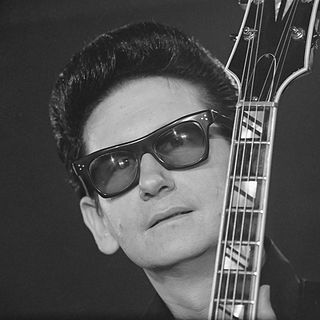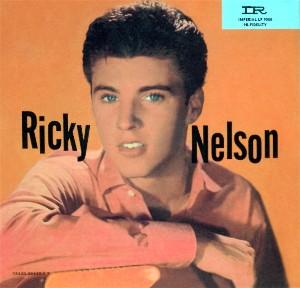
Roy Kelton Orbison was an American singer, songwriter, and musician known for his impassioned singing style, complex song structures, and dark, emotional ballads. His music was described by critics as operatic, earning him the nicknames "The Caruso of Rock" and "The Big O." Many of Orbison's songs conveyed vulnerability at a time when most male rock-and-roll performers chose to project masculinity. He performed while standing motionless and wearing black clothes to match his dyed black hair and dark sunglasses, which he wore to counter his shyness and stage fright.
Wilbur H. "Will" Jennings is an American songwriter. He is popularly known for writing the lyrics for the songs "Tears in Heaven" and "My Heart Will Go On". He has been inducted into the Songwriter's Hall of Fame and has won several awards including three Grammy Awards, two Golden Globe Awards, and two Academy Awards.

Barry Manilow is an American singer with a career that spans seven decades. His hit recordings include "Could It Be Magic", "Mandy", "I Write the Songs", "Can't Smile Without You" and "Copacabana ".

"Only the Lonely " is a 1960 song written by Roy Orbison and Joe Melson. Orbison's recording of the song, produced by Fred Foster for Monument Records, was the first major hit for the singer. It was described by The New York Times as expressing "a clenched, driven urgency". Released as a 45 rpm single by Monument Records in May 1960, "Only the Lonely" went to No. 2 on the United States Billboard pop music charts on 25 July 1960 and No. 14 on the Billboard R&B charts. "Only the Lonely" reached Number One in the United Kingdom, a position it achieved on 20 October 1960, staying there for two weeks. According to "The Authorized Roy Orbison," "Only the Lonely" was the longest charting single of Orbison's career. Personnel on the original recording included Orbison's drummer Larry Parks, plus Nashville's regulars, Floyd Cramer on piano, Bob Moore on bass, and Hank Garland and Harold Bradley on guitars, Joe Melson and the Anita Kerr Singers on backing vocals. Drummer Buddy Harman played on the rest of the songs on the session.

Roy Orbison was an American singer-songwriter who found the most success in the early rock and roll era from 1956 to 1964. He later enjoyed a resurgence in the late 1980s with chart success as a member of the Traveling Wilburys and with his Mystery Girl album which included the hit single "You Got It". At the height of his popularity, 22 of Orbison's songs placed on the US Billboard Top 40 chart, and six peaked in the top five, including two number one hits. In the UK, Orbison scored ten top-10 hits between 1960 and 1966, including three No. 1 singles.
"Dream", sometimes referred to as "Dream ", is a jazz and pop standard with words and music written by Johnny Mercer in 1944. He originally wrote it as a theme for his radio program. It has been and performed by many artists, with the most popular versions of this song recorded by The Pied Pipers, Frank Sinatra, and Roy Orbison.
Sonny Curtis is an American singer and songwriter. Most of his work falls into the pop and country genres. He was a teenage friend and band member with Buddy Holly in Lubbock, Texas.

"Could It Be Magic" is a song with lyrics by Adrienne Anderson and music by Barry Manilow, inspired by Frédéric Chopin's Prelude in C minor, Opus 28, Number 20.
"I've Got The World on a String" is a 1932 popular jazz song composed by Harold Arlen, with lyrics written by Ted Koehler. It was written for the twenty-first edition of the Cotton Club series which opened on October 23, 1932, the first of the Cotton Club Parades.

"Kaw-Liga" is a country music song written by Hank Williams and Fred Rose.

John Pisano is a jazz guitarist born in Staten Island, New York.
Richard Buchanan Kerr is an English composer, who co-wrote "Mandy", "Looks Like We Made It" and "Somewhere in the Night" and "I'll Never Love This Way Again", for Dionne Warwick.
The first season of the Theme Time Radio Hour, hosted by Bob Dylan, ran from May 3, 2006, to April 18, 2007 on XM Satellite Radio for a total of 50 shows.

"Go Go Go " is a song by Roy Orbison, released in 1956. According to the authorised biography of Roy Orbison, this was the B-side to Orbison's first Sun Records release "Ooby Dooby". This was the first song written by Orbison.

Ricky Nelson is the second album by teen idol Ricky Nelson, released in 1958. The album charted in the Top 10 on the Billboard album charts, and has since been re-issued on iTunes.
"You Win Again" is a 1952 song by Hank Williams. In style, the song is a blues ballad and deals with the singer's despair with his partner. The song has been widely covered, including versions by Ray Charles, Jerry Lee Lewis, Roy Orbison, the Grateful Dead, Charley Pride, Bob Dylan, and the Rolling Stones.

Let's Love While We Can is the thirty-seventh studio album by American pop singer Andy Williams, released in the U.K. in 1980 by CBS Records. For this project Williams eschews covering well-known pop hits and standards and relies mostly on original or lesser-known country songs.

Roy Orbison's Sun Recordings were made by Orbison at Sun Studio with producer Sam Phillips. Sun Records was established in 1952 in Memphis, Tennessee, and during an eight-year period Phillips recorded such artists as Roy Orbison, B.B. King, Howlin' Wolf, Ike Turner, Rufus Thomas, Elvis Presley, Johnny Cash, Jerry Lee Lewis, Carl Perkins, Harold Jenkins, and Charlie Rich. The musicians signed at Sun Records made music that laid the foundation of rock and roll in the 20th century.
All the Time may refer to:
"You Tell Me" is a song originally recorded by Johnny Cash. It was written for him by Roy Orbison.









